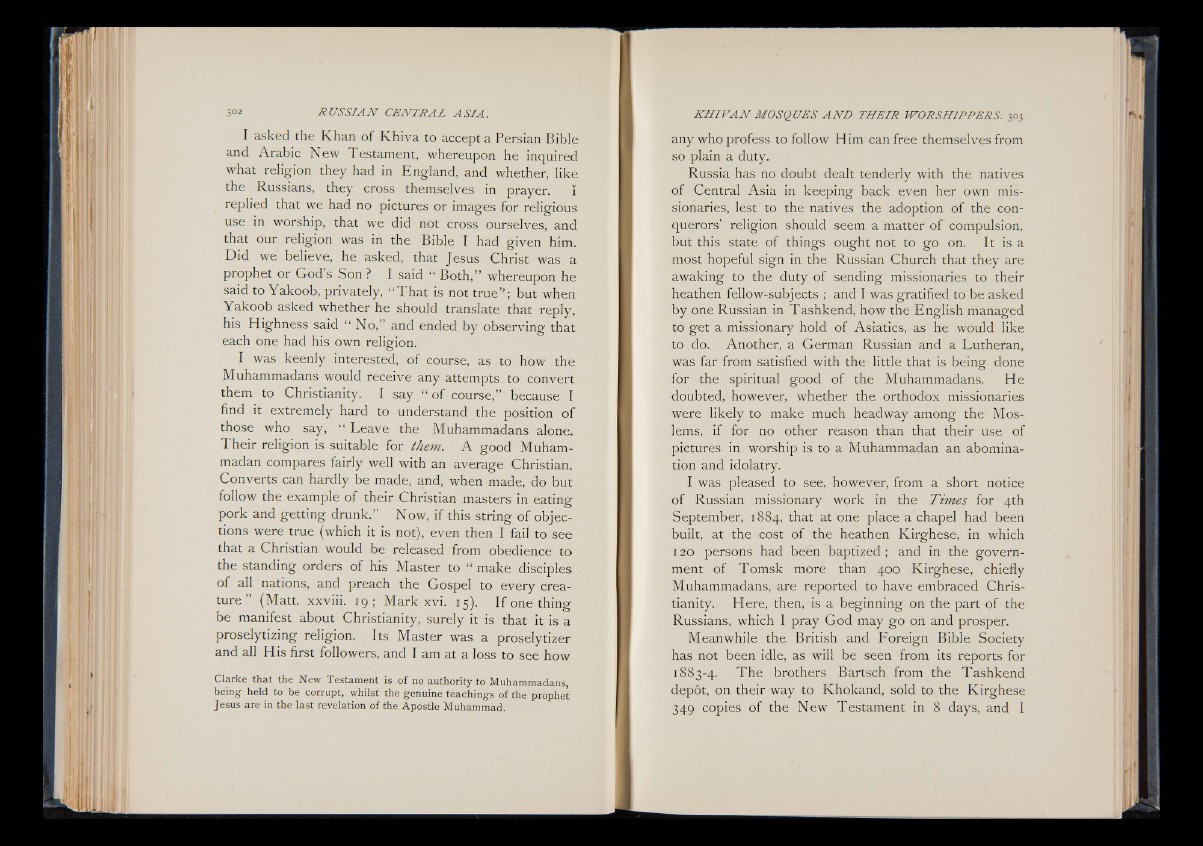
I asked the Khan of Khiva to accept a Persian Bible
and Arabic New Testament, whereupon he inquired
what religion they had in England, and whether, like
the Russians, they cross themselves in prayer. I
replied that we had no pictures or images for religious
use in worship, that we did not cross ourselves, and
that our religion was in the Bible I had given him.
Did we believe, he asked, that Jesus Christ was a
prophet or God’s Son ? I said “ Both,” whereupon he
said to Yakoob, privately, “ That is not true” ; but when
Yakoob asked whether he should translate that reply,
his Highness said “ No,” and ended by observing that
each one had his own religion.
I was keenly interested, of course, as to how the
Muhammadans would receive any attempts to convert
them to Christianity. I say “ of course,” because I
find it extremely hard to understand the position o f
those who say, “ Leave the Muhammadans alone.
Their religion is suitable for them. A good Muhammadan
compares fairly well with an average Christian.
Converts can hardly be made, and, when made, do but
follow the example of their Christian masters in eating
pork and getting drunk.” Now, if this string of objections
were true (which it is not), even then I fail to see
that a Christian would be released from obedience to
the standing orders of his Master to “ make disciples
of all nations, and preach the Gospel to every creature
” (Matt, xxviii. 19; Mark xvi. 15). I f one thing
be manifest about Christianity, surely it is that it is a
proselytizing religion. Its Master was a proselytizer
and all His first followers, and I am at a loss to see how
Clarke that the New Testament is of no authority to Muhammadans
being held to be corrupt, whilst the genuine teachings of the prophet
Jesus are in the last revelation of the Apostle Muhammad.
any who profess to follow Him can free themselves from
so plain a duty.
Russia has no doubt dealt tenderly with the natives
of Central Asia in keeping back even her own missionaries,
lest to the natives the adoption of the conquerors’
religion should seem a matter of compulsion,
but this state of things ought not to go on. It is a
most hopeful sign in the Russian Church that they are
awaking to the duty of sending missionaries to their
heathen fellow-subjects ; and I was gratified to be asked
by one Russian in Tashkend, how the English managed
to get a missionary hold of Asiatics, as he would like
to do. Another, a German Russian and a Lutheran,
was far from satisfied with the little that is being done
for the spiritual good of the Muhammadans. He
doubted, however, whether the orthodox missionaries
were likely to make much headway among the Moslems,
if for no other reason than that their use of
pictures in worship is to a Muhammadan an abomination
and idolatry.
I was pleased to see, however, from a short notice
of Russian missionary work in the Times for 4th
September, 1884, that at one place a chapel had been
built, at the cost of the heathen Kirghese, in which
120 persons had been baptized ; and in the government
of Tomsk more than 400 Kirghese, chiefly
Muhammadans, are reported to have embraced Christianity.
Here, then, is a beginning on the part of the
Russians, which I pray God may go on and prosper.
Meanwhile the British and Foreign Bible Society
has not been idle, as will be seen from its reports for
1883-4. The brothers Bartsch from the Tashkend
dépôt, on their way to Khokand, sold to the Kirghese
349 copies of the New Testament in 8 days, and I